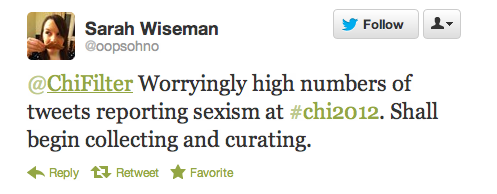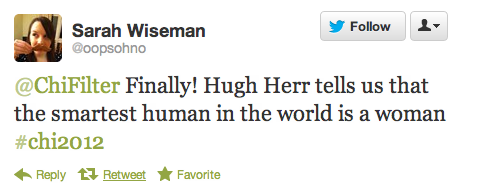CHI this year was incredible. Amazing. It was my first international conference and wow, what an experience it was. I saw so many fantastic and thought provoking presentations, from the brilliant ones on text entry (my one true academic love) to a fascinating presentation on making interactions purposefully uncomfortable. Everything was very thought provoking. And the parties afterwards. Well. Austin is the most partyful town around. The evenings were unforgettable whilst at the same time being slightly hazy the next day… Overall, it was, as one house in Austin put it: lovely.
Now, with that stellar review in mind, I want to talk about the less awesome side of CHI this year, and that was the feeling of gender discrimination running through the event. This was something that I began to notice myself, and then began picking up on when reading the CHI related tweets (the twitter community made this event even better, reporting on interesting talks when you were unsure about where to go, and letting the conference venue know that the air conditioning needed turning down!) Let me tell you the story through a series of tweets. [All the tweets used here are from public accounts and, when not from me, have had user details removed.]
Before attending CHI, my supervisor had asked me if I was going to the Women’s Lunch. I said I wasn’t. I am keen on supporting women in fields where they are under represented, I was a member of the Hoppers society in Edinburgh and helped organise events to offer support to female computer science students and also invited female speakers to talk about a career in industry. I felt these events were necessary and justifiable because females were so under represented on our course. And we regularly heard tell of discrimination against the women doing computer science. The drop out rate for females on the course was significantly higher than for males. So in these situations I believe that providing support and gender specific events is important. However, in domains where there is not a clear divide, I think that holding events specifically for women is hard to justify, and discounts from fields where this support is necessary. That’s how I felt about the HCI community, there are plenty of women in the office here at UCL, and were plenty in the office at York. Therefore, in my eyes there was no problem, and so no, I would not be attending the Women’s Lunch at CHI.
Now, at the conference. I had a paper accepted into the Text Entry workshop. Awesome! I was very excited about this. When I turned up, I was the only female in a room of around 25 people. This was unexpected. I was not made to feel different or excluded, and felt part of the group, but I didn’t think I’d be the only female there. Meeting up with my supervisor later that day I admitted that maybe the number of women in HCI perhaps wasn’t quite the same as the number of men.
At the opening keynote I was to find out! We were presented with a breakdown of the people who were attending CHI. One pie chart showed the number of students, academics, and industry types that were attending this year. Very interesting. The next chart showed the gender split. From memory, the split was around 60% male, 39% female and 1% not answered.
This was fine, interesting graphs, good to know who’s attending, made me realise the small number of females. Now, what happened next was not so fine. The Conference Chair, Joseph Konstan was up next. He took the stage wearing an oversized cowboy hat, which covered his eyes in shade, so we could only see his mouth. He decided to make a joke about the pie chart, he said something along the lines of “maybe next year we can run a session to help those people work out what they are!”. I was shocked. Now I don’t know who was in that 1% of people who didn’t answer, it could be people choosing not to divulge that information, or it could be people who feel that of the two options: male or female, neither suited them. But to come on stage and say he would “help them find themselves”, that showed a level of incredible ignorance, and could definitely have been very insulting to some people. I wasn’t the only one to notice.
This was when I became aware of people reporting these sorts of things on twitter. And the fact that I had to start collecting the tweets. Like sexist pokemon.
One person pointed out that many of the examples being used in talks, when needing to talk about a novice user were female, the “soccer moms” and the old ladies. No male novice users out there apparently.
Some others pointed at the way that women were being treated at the conference, one person letting men know that if a woman shows any interest in your work, it’s best not to tell that women that you think she may not be smart enough to grasp the content.
Another person pointed out how, in one session, a female first author was introduced as “talking on behalf of her coauthors” whereas all the male speakers in that session were simply introduced, even if they weren’t the first author.
Then we take a look at the videos presented this year. A couple were quite interesting. One, for a device called TEROOS, showed a robot on a woman’s shoulder, being controlled by a man. Whereas another showed a women stressing out over having to cook a meal, everything was going wrong but with a smart cooking system, she was able to make the meal successfully in the end. That was fine. But then we find out she has been stressing out over a meal she is cooking for a man. She places it on the table in front of him then watches him eat. She has not made anything for herself, just the man. In fact at the end she has to ask the man if she is allowed to have a bite of the meal she’s made. Thankfully she is allowed some, and doesn’t starve.
All this. In the space of one week. Maybe I was wrong about the discrimination at CHI. It’s there alright. And I know, sometimes it’s symbolic (in the case of the videos) but there were still reports of women being made to feel inferior due to their gender, whilst at the conference itself. And this just isn’t good enough.
By the end of the conference, I think that this had come to the attention of the organisers, and when Joseph Konstan got up to give the closing speech, he apologised. But he didn’t really apologise. The message he gave was something along the lines of “I’m sorry if you were offended”. As in, ‘I’m sorry if you chose to be offended by this thing I said that I do not believe to be offensive’. Meh. He talked about “slips of the tongue” which I think can’t justify the prevalence of these sorts of comments. These aren’t just slips of the tongue, they represent an ingrained and malformed beliefs that need to be addressed if we are to feel like this community is an equal one.
The one shining light at the end of the tunnel came from Hugh Herr. Hugh Herr gave the closing keynote. And what an inspiring keynote it was, about the fantastic work his lab at MIT is doing for amputees. During his presentation, he spoke of how humans were designed, and then spoke about what the smartest human in the world would do, how she would design a human. Fantastic. There you go. Hugh Herr’s hypothetical smartest human is a woman. There, that wasn’t hard.
I don’t want this post to seem like I was bitter at CHI, or that I didn’t feel welcomed into the community. Because I did feel welcome, I really did. But the fact is that mine wasn’t a universal experience. It is clear that in some areas, some men are still making everyone else feel like second class citizens there, and sometimes joking at their expense. And this isn’t good enough. I’m not suggesting that every talk at CHI next year lists women as the superior gender, all I’m asking for is some equality. Something needs to change.










Hm. Been there. So I’m broadly in sympathy, but I am also surprised by the vehemence of your reaction. In my opinion it is often (but not always) appropriate to challenge sexist language, behaviour, and assumptions when you encounter them, especially if they are or are at risk of becoming embedded in a context you self-affiliate with. Enlisting the support of peers and others can make your actions even more effective, or at least make you feel less isolated. To me, your reaction seems disproportionate to the offence(s). Not that I’m justifying the behaviour which irked you. Just saying that there’s way worse out there, so keep your powder dry. Or at least keep some in reserve for future battles…
Meant to say “”But to me, your reaction…” not “To me, your reaction”. Could you please publish both my correction and the original or neither? ta
I disagree with Heather. This stuff accumulates. The more the “little” stuff flies under the radar, is not reacted to, or is defended as being too small to bother with (unless you are oversensitive, obviously, which is YOUR fault!), the more the message is sent that the low-level sexism is actually ok, and it is ok to see gender differences like that. Hey, maybe it is actually funny, rite?
If/when it bugs you, I really don’t think you should have to defend speaking out against it. I’m another person who has occasionally been bothered by that little subclinical buzz of sexism which just builds up over days or weeks or months without becoming blatant enough that everyone agrees that you have a “right” to react.
And yes, am another IT type, in the UK.
Hi, Lynne – Based on what I said, and what you said, I don’t think we _necessarily_ disagree. Although we may in fact disagree. Was I suggesting it was correct to ignore offensive behaviour? No. Was I attacking sarah for speaking out? No. (Do I think the intensity and passion of the reaction was in proportion to the facts of the offences as I heard them stated? Also – no.)
I’m glad we agree that these things need to be highlighted. It’s only through raising awareness of this sort of thing happening that anything will change.
I’m surprised you think my reaction is disproportionate, I saw this as a report on the general mood and feeling of people at CHI, rather than my own opinions. Though I do agree this is not a completely objective report. I suppose this is my way of ensuring this sort of thing is not ignored and swept under the carpet. This is an important issue currently for women in all areas of the science and technology community and I feel it deserves some enthusiastic backers who want to work towards creating an atmosphere of equality. Right now, whilst I am passionate about this topic, it makes sense to me to bring attention to it and make clear my feelings about it.
Thank you for your comments. I’m really glad this issue is being discussed.
Thanks for a great post and comments. I agree that there’s an undercurrent of sexism, which probably isn’t too surprising given there’s still an undercurrent (or in some cases a tide) of sexism in the larger world.
The so-called MatriarCHI (formerly the Foremothers) has been trying to find ways to support women over the years (as well as to remind people that it was largely WOMEN who formed SIGCHI back in 1982 – not that we get the credit) That’s how the women’s lunch came to be. However, perhaps we as a community need to address the sexism head-on instead or in addition.
What do you guys think? And how should we all do this?